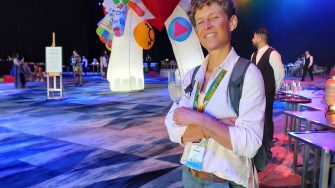Breaking the bias of the STEMM rainbow community
UNSW PhD researcher joins thousands of others at the Sydney WorldPride Human Rights Conference.
UNSW PhD researcher joins thousands of others at the Sydney WorldPride Human Rights Conference.

The party might be over but Sydney WorldPride has left a mark in the mind and heart of UNSW School of Photovoltaic and Renewable Energy Engineering PhD candidate, Ina Oestroem.
She joined thousands of others at the 2023 Sydney WorldPride Human Rights Conference which was held over three days at the International Convention Centre in Sydney.
As the largest LGBTQIA+ Human Rights Conference ever to be held in the southern hemisphere, attendees explored the journey of LGBTQIA+ human rights as it stands today and the vision for the future.
The Conference had a full program of inspiring keynotes, panels and roundtables with interactive workshops, performances and facilitated networking events.
Ina shares some insights and learnings from the Conference:
This Human Rights Conference was dedicated to all matters related to the LGBTQIA+ community. My biggest highlight from the three days is realising about how far we've come in terms of assuring basic human rights for the LGBTQIA+ community, yet it is shocking to realize how much work there’s still to be done.
Some examples of this are:

We need urgently to create and cultivate a culture of diversity, inclusion and belonging. We need to add human elements to what we’ve cultivated over many years as hard and rational scientists – and that can be done with role models that represent these communities. Different perspectives of life will lead to diverse thinking, and this can only result in a win-win solution to the global challenges the STEM fields work so hard to solve.
Another way to do this is start to have a look into adding the A (for Arts) into the STEAM alphabet. Arts and Science has gained much more attention lately, and the influence it has in creativity might be a good way to “soften” our view of science that allows us to reach different angles, while still maintaining our rigorous scientific methods.
In my personal opinion, the key takeaway is that Equity Diversity and Inclusion is the missing link to innovating the technological revolution that will help us solve (or at least tackle) global challenges, for example the United Nations Sustainability Development Goals. However, we need to take care of the communities that are still fighting for basic living conditions. To do that, we need to unite the extensive network of all people including LGBTQIA+, female and people with a disability communities. Together we make a bigger and stronger community that strives towards a better world.